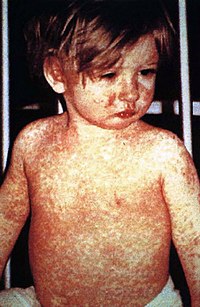
Photo from wikipedia
The incidence of Japanese encephalitis (JE) has significantly decreased in China due to JE vaccines. In this study, we investigated the post-JE vaccination seroprevalence and protection provided by vaccinated sera… Click to show full abstract
The incidence of Japanese encephalitis (JE) has significantly decreased in China due to JE vaccines. In this study, we investigated the post-JE vaccination seroprevalence and protection provided by vaccinated sera against Japanese encephalitis virus (JEV) to elucidate the persistence and waning of antibodies to JEV among JE-SA14-14-2-vaccinated children. A total of 300 serum samples were collected from vaccinated children aged 3–10 years in Zhaotong, Yunnan, China. The seroprevalence of anti-JEV antibodies was determined by enzyme-linked immune sorbent assay and plaque reduction neutralization test. The highest seropositivity of 82% was observed in vaccinated children during the first 0.5–1.5 years after booster vaccination. Then, the seropositivity began to decline and remained lower than the original level observed in the 0.5–1.5-year group. An association was found between the waning of seroprevalence and elapsed time of the post-booster vaccination. Similarly, the neutralizing antibody (nAb) titres gradually decreased over time, and the levels showed a positive correlation with the protective efficacy in mice. This finding suggests that nAbs play an important role in the antiviral process and that the nAb titre is an adequately credible parameter for evaluating the protective efficacy induced by the JE vaccine. Our results provide data that clarify the persistence and waning of antibodies to JEV, which may help elucidate the pathogenesis of JE.
Journal Title: Virologica Sinica
Year Published: 2019
Link to full text (if available)
Share on Social Media: Sign Up to like & get
recommendations!